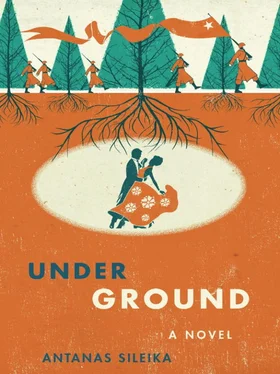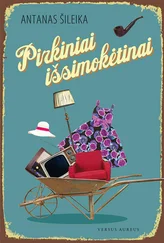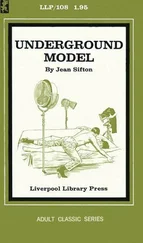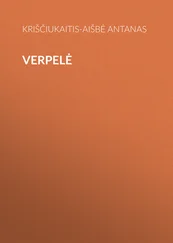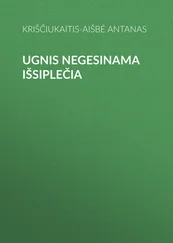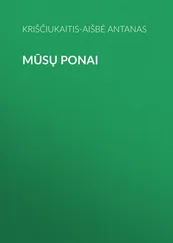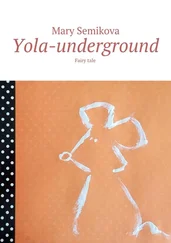The mood back at the dormitory had changed since Ignacas had been taken away. People spoke far less than they used to, and there was a kind of sullenness in the air. No one threw parties. Lozorius was preoccupied as well, absent most of the time, but silent and furtive when they met.
Three days later, Vincentas appeared at Lukas’s classroom door as the students were leaving. Lukas embraced him, relieved that he would not have to write the dreadful letter to his parents. Vincentas looked tired and frightened. His spectacles were crooked and Lukas could see thumbprints on them.
Their parents were religious, and of all the children, Vincentas had taken to religion most. He always seemed to look through the surface of things to something good beyond. But now he seemed to have seen something less than divine.
“Did they beat you?” Lukas asked.
“A little. Not much. Not as badly as some of the others. They just kept questioning me about a paper I was supposed to have been aware of. The cell was very full and it was hot in there.”
“What paper?”
“Some sort of subversive document they found in the room next to mine. I was supposed to have known about it.”
“Did you?”
“No.”
Vincentas broke off and looked at Lukas searchingly. Lukas was not sure what he wanted at first, but divined that Vincentas was seeking some sort of support or direction from his older brother.
“You should go back to the seminary and get some sleep,” said Lukas.
“Somebody betrayed me there. I wouldn’t feel good. And besides, the authorities released me.”
“You weren’t guilty.”
“No, but the other two were kept behind and I know one of them was beaten badly. If I was released, the others will think I’ve been let go to spy among them.” Vincentas looked down, as if he could not bear to look into his own brother’s eyes.
This was not the same Vincentas who had walked to Kaunas with Lukas several weeks earlier. It seemed odd that he should be so shaken by what had happened. Anyone so shaken after three days in a cell and lucky enough to have been released would not do well under greater pressure.
Refusing to do so much as step into a classroom at the seminary, Vincentas moved in with Lukas, who tried to get leave documents that would permit them to return home for a few weeks. But the noose around the necks of men of their generation was tightening. Travel documents were getting harder to obtain and there was talk that the humanities department would be closed down altogether.
Vincentas brooded in Lukas’s residence room day after day and week after week, stretched out on one of the beds most of the time. There was room now: Ignacas and the lowlander were gone, and Lozorius had disappeared. In an effort to distract Vincentas from his musing, Lukas made him go with him to some of the classes at the university. They were returning from just such a class late one winter afternoon when they ran into Lozorius, walking along the narrow sidewalk of an empty quarter in the old town.
Lukas’s fellow student was utterly transformed from the distracted Cheka recruit of a few short weeks before. He walked with an easy step that one hardly ever saw on the streets any longer. He was slightly cocky, his eyes prominent and bright, his shoulders square. As always, his ears were turned out, making him seem a little funny too.
“Vincentas!” said Lozorius happily. “You got out of prison. Congratulations! Did the Cheka try to recruit you?”
“No,” Vincentas said awkwardly, removing his glasses and wiping them distractedly, “they just beat me. A little.”
“Consider it a positive sign of your true heart. They knew you could never betray anyone from the moment they saw you. Believe me, the Chekists are some of the best psychologists in the country.”
Lukas looked around uneasily. One did not have these kinds of conversations in the street any longer. The Jewish quarter was mostly empty, many of the windows just gaping holes in the buildings, the glass and even the frames smashed. But there could be squatters in there somewhere among the abandoned houses and courtyards, people who might be scavengers of information they could sell to the Cheka. Three people talking together on the street would also be suspicious to police or military patrols. The army would want to know why they were not in uniform, and the police would separate them and ask what they had been talking about. Anyone who did not behave as if he were hunted was an affront to the hunters, an insult to their power.
Lukas tugged on Lozorius’s sleeve. “Come in here.”
They stepped through the broken door of a wooden house, and then went more deeply inside to another room that had no other light but what came in through the doorway. The place smelled of mould and cat piss. When they could go no farther, Lukas turned and looked at Lozorius, whose face beamed unnaturally in the gloom.
“You look well,” said Lukas.
“I feel it.”
“Did you reconcile yourself to working for the Cheka?”
“The opposite, actually. I decided that I couldn’t live like a slave. I needed to be free, so I made myself free in my mind.”
Lukas believed in good spirits and a light tone, but the world they were living in was getting darker. They were under their third occupation in six years, and had become like grain in a mill—soon the stones would grind them to dust.
“So what are you doing here?” he asked. “I haven’t seen you around for weeks.”
“I have to organize the transport of a printing press, no easy matter these days.”
“A printing press?”
“I’m with the partisans now.”
“Keep your voice down,” said Lukas.
Lozorius laughed, his voice echoing slightly in the empty room. “Nothing to fear around here. The place is deserted. Anyway, with the printing press, we make up our own documents. I’m moving around with forged documents myself. I passed through three checkpoints today without any problem.”
Lukas considered the information. Under the Reds, one could not go anywhere without some kind of document. Papers were needed to leave town, to live in town and to undertake any sort of trip at all.
“Our younger brother, Algis, is hiding out at home because he’s afraid to be taken by the army,” said Lukas.
Lozorius reached into his breast pocket. “No problem. I have some blank military exemptions. Here, take two. The only things you need to be careful about are the official stamps, but if you have any skill at all with carving tools you can make those up yourselves.”
“You’re not afraid?” Vincentas asked.
“Not anymore. The forests are full of people like me. We rule the whole countryside by night, and some parts by day as well. It’s only in cities like this where young men tremble.” He looked at his watch, squinting to make out the hour in the gloom of the abandoned house. “I have to get moving. It’s a complicated job, because even a small press is heavy. Good luck in your studies. I’ll see you around.”
Although it had been good to see Lozorius, the street seemed all the more forlorn after he left, the dormitory all the more unwelcoming for his absence. Vincentas lay down on an empty bed and stared at the ceiling as Lukas sat at the desk and tried to read. The university had quickly instituted an obligatory course on Marxism-Leninism, but there were not enough texts and he had to read his own quickly before passing it on. The economic theory was deathly boring and did not hold his interest.
The dormitory was unusually quiet for late afternoon, a time when students should have been returning to their rooms.
In winter the night came early, and soon it became too dark to read. Lukas turned on the overhead lamp and looked over to see if Vincentas was sleeping. He was not. Behind his eyeglasses, his eyes were open and fixed upon the ceiling.
Читать дальше
